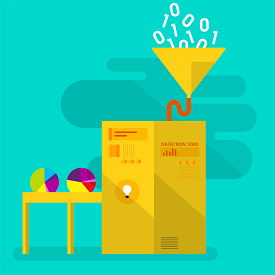Autonomous Marketing: Using data to perfectly personalize marketing efforts
How do you retain the creative side of marketing when big data and autonomous marketing inevitably change the way marketers work? Data insights enhance the efficacy of your marketing efforts; however, human input is always necessary to decipher big data. Autonomous marketing, used to enable marketers and nail down effective marketing campaigns, is the secret to realizing business impact.
Metrics for the Mind
The application of a utonomous marketing is a necessary next step in meeting a new demand, but it doesn’t supplant the need for marketers in the flesh. According to Jeff Marcoux, Senior Product Marketing Manager for Microsoft Dynamics CRM, marketers will never be forced to relinquish their instincts and creativity—their marketing guts—because analytics, data, and insight help fuel creativity.
utonomous marketing is a necessary next step in meeting a new demand, but it doesn’t supplant the need for marketers in the flesh. According to Jeff Marcoux, Senior Product Marketing Manager for Microsoft Dynamics CRM, marketers will never be forced to relinquish their instincts and creativity—their marketing guts—because analytics, data, and insight help fuel creativity.
“The main reason I say that,” said Marcoux, “is because there’s always going to be new channels and marketers have to come up with new ways to use them.” Take for example the exodus of college-age students from Facebook (which Marcoux attributes to the fact that their parents on are on it) to something more like Snapchat. Although data may shed some insight on the shift, it’s up to marketers to take advantage of it in a creative way (e.g., showing loyal fans a secret menu or product announcement before the rest of the world gets to see it).
Take Colorado University’s Online program at their Anschutz Medical Campus, which faced the challenge of how to remain competitive to college students and reach potential students on their own terms. CU used Microsoft Dynamics CRM to identify what their potential students liked, the media they consumed, and the social networks they used—processes that would normally take marketers months of research—and automated it so their marketing team could focus on killer campaigns that would engage the potential students they did find. The result? Increased student retention and recruitment.
Coming up with the emotional content that drives a campaign is where the creativity and experience come in. Marcoux sees autonomous marketing as a way to free up marketers to do what they love—create and innovate—and, today, there’s plenty of opportunity to innovate as campaigns become increasingly personalized.
A Mind-Body Approach to Marketing
Customers don’t want to be just a number; they want to be known. “With social media, everything is personal and everything is online,” said Marcoux. “Hooking” modern consumers is a matter of building those personal, emotional relationships—identifying who they are and what their need is, educating them on a solution, and then ultimately providing that solution.
“We’ve seen that personalization come across in emails and social posts, but that’s all been enabled by big data,” said Marcoux. Customers are already so far down the buying cycle when they get to you (nearly 57%), and getting personal is the only way to land your message and have it resonate with consumers these days.
Autonomous marketing powered by data insights helps marketers gather and combine information from many different sources in order to figure out what content is working. This way, marketers can focus on what is actually selling their product rather than getting petrified by what Marcoux calls “analysis paralysis,” or the misinterpretation and incorrect analysis of data.
Ultimately, autonomous marketing is a way to deal with the deluge of social data and other information to help marketers do their job better. Reimagining marketing, according to Marcoux, is a matter of using big data to narrow in on those granular market segmentations and continuing to fine-tune an effective, personalized marketing approach that will hook and keep hooked customers.
